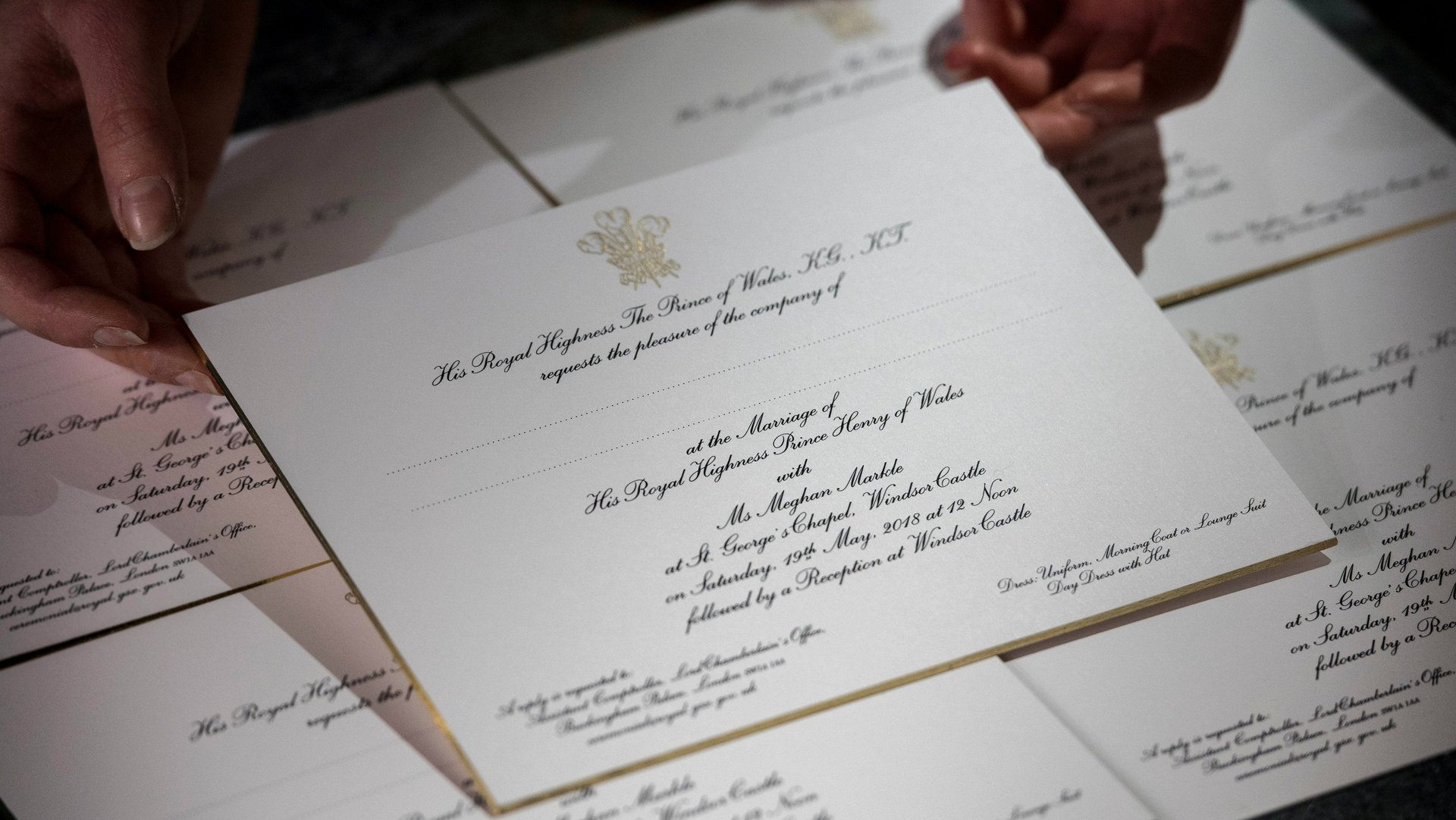A wedding invitation should come with a price tag
Who among us cannot relate to Georgina Childs?


Who among us cannot relate to Georgina Childs?
The 30-year-old woman appeared on daytime British television recently in a state best described as politely-contained rage. Childs’ predicament—racking up so much debt from attending her friends’ weddings that she had to move back in with her parents —may have been the result of some unwise financial choices. But her decision to awkwardly bare all on one of Britain’s most-watched morning shows was, I think, a deeply subversive act.
That’s the thing about weddings: They are undeniably fun to go to, but they are also extremely expensive. Everyone knows this. Everyone even talks about it (constantly, if you happen to be in your late twenties to mid-thirties). But no one seems willing to express their shared frustration to the people who have the power to change it: the couple that’s hosting the wedding.
Of course not. That would be rude, right? I guess. However, few other things in our world are like this. If you are expected to shell out for an event ticket, conference, or social engagement, the price is made clear ahead of time. After all, it’s a crucial piece of information that helps you decide if you should go. But for some reason—perhaps the outsized importance that patriarchal, capitalist society places on the concept of marriage and the celebration that goes along with it—weddings are exempt from this administrative requirement.
And while the etiquette around weddings hasn’t changed, the celebrations certainly have. No longer are we running to the local town hall to get married and having a reception in a friend’s backyard. We’re flying to Bali, renting llamas, having bachelorette parties in Nashville, and getting ready in the suite at the Ritz with makeup and hair by a glam squad fit for a Kardashian. Our culture’s fervor for ever-more-extravagant weddings has escalated to the point that those celebrations don’t just cost hosts big money, but their guests, too. All of which is to say: I think wedding invitations should come with a price tag.
According to the Real Weddings Study from The Knot—the digital wedding mega-brand that is the apotheosis of commercial wedding culture—the average guest spend at a wedding in 2017 was $268, up from $194 in 2009. (It’s worth noting that The Knot’s widely-cited study has been criticized for its self-selecting respondents, who are more likely to be big wedding spenders.) If the betrothed opt for a destination wedding—as so many couples do these days—the average guest spend is $1,421 in the US and $2,514 if the wedding is abroad, according to a survey from credit card company CompareCards.
The calculation about whether or not to attend a destination wedding is about so much more than just money, too. It’s about taking time off from work, potentially arranging childcare, deciding if you like this person enough to visit Miami yet again. These are all questions that Quartzy explored in our destination wedding chatbot, which provides the cost benefit analysis that invitations so often obscure.

However you slice it, these numbers are expensive. But it doesn’t even begin to touch upon the kinds of unspoken costs that wedding guests seem to be routinely and invisibly asked to drop as wedding day approaches: The decision to have a wedding on a Tuesday saves the hosts money, but means your guests have to take a day off on each side; the “cash bars”; the night-before cocktail receptions where drinks aren’t included; the Ubers ferrying guests from the ceremony to the reception to the afterparty and then off to the brunch the next day.
Even the Royal Family engaged in these shenanigans, asking 1,200 of their “guests” to BYO picnic to Meghan and Harry’s wedding this weekend. By the time you’ve bought a gift for the engagement shower, bachelorette party, and wedding itself, you’ve spent the equivalent of a two-week vacation you never took.
Recently, a friend recounted a wedding she’d been invited to in Mexico where guests were instructed, in no uncertain terms, that they must attend for a minimum of three nights and stay in a specified, all-inclusive resort. When she did the work of figuring out what it would take her to travel and stay there (which was notably absent from the email) it was north of $2,000. “How do I tell the bride I can’t go?!” she asked me. I suggested she screenshot the price tag.
Up until recently, no one had captured the silent outrage that tends to fester among friend groups when an email chain subtly asks for a week’s pay. In the book Hey Ladies: The Story of Eight Best Friends, One Year, and Way, Way Too Many Emails, co-authors Caroline Moss and Michelle Markowitz deliciously satirize the whole charade through a fictitious group of girlfriends planning a wedding—and all the additional celebrations that go along with it—via group emails and private texts.
As a reader, I felt physical discomfort when the character I related most to, Gracie, does what so of many of us have once been forced to do thanks to the status of our bank account: Cheerily tell our dear friend that we can’t afford to drop a bunch of money on their life event.
Hey Jen, I hope you’re doing well,” Gracie writes via text “I wanna thank you so much for including me as a bridesmaid, but I was just looking over my budget and with saving up for grad school, I’m not sure I can afford the Oscar [de la Renta] dress. I’d still love to help out in any way for your big day (guest book attendant? Lol). Hope this is ok :)
According to Ivy Jacobson, The Knot’s senior digital editor, millennials are getting invited to weddings more and more—and many of those celebrations are further afield. And yet, from an etiquette standpoint, she told me that my feeling that it was the host’s responsibility to provide a clear cost analysis was totally off-base.
“When you’re being asked to attend a wedding, it’s never on the couple to let you know how much the travel fees will be, how much it will cost to get there or stay there.” She added that when one does turn down an invitation or request to be part of the bridal party for financial reasons, the best course of action is to be vague and not cite your bank account as the reason. “I don’t know of too many people who would want to say ‘I just can’t afford to fly to San Francisco to New York for your wedding, I’m really sorry.’ Hearing that from 200 guests may make [the couple] feel bad about having a destination wedding.”
I am no etiquette expert, but therein lies my point. The fact that wedding invitations are so often removed from the cost they imply means that hosts are able to pass costs on to guests. Note this piece of wedding-planning advice, which breezily notes that “destination weddings are substantially cheaper in most cases.” (They are no doubt talking about the host’s bottom line, not the guests’.)
Jacobson noted that many couples do make a concerted effort to be transparent about the costs of attending their wedding. She advises couples to offer a slew of budget-conscious accommodation options, usually on their wedding website, to make sure it’s affordable for everyone. But this is still a courtesy, rather than an expectation.
If it were standard, albeit mercenary, to include a line-budget with every email invite—Example: “Flight to LA on a Labor Day weekend: at least $250″—hosts might be more considerate and aware in their party planning. And I suspect that fewer people would be brazen enough to send an invite with a $2,000 price tag—and even fewer would dream of adding a gift registry on top of that.
Moss and Markowitz have a theory about why wedding celebrations have turned into a kind of financial one-upmanship. In addition to the fact that not going to a friend’s wedding is a much bigger deal than skipping, say, their birthday party, the social media that surrounds weddings makes our attendance—or absence—so much more visible.
“There is an expectation there that is all over social media and you’ve gone to your friends’ weddings—so there is an element of ‘this person owes me because I did it for them,’” Moss said. “There is a lot of pressure that this is going to be your one moment and your friends will get over it [and spend the money].”
Hey Ladies is not intended to skewer the tradition of weddings or people who have them. ”We’re making fun of ourselves,” the intro reads—a generous sentiment the book’s self aware humor lives up to. But both authors noted that the idea was born out of an experience where the higher expectations of weddings and the “performative aspect of group emails” where these plans take shape started to feel slightly oppressive. After all, it’s not just the wedding we’re spending money and time on—but the ancillary events that precede it.
“I think about weddings I’ve gone to where I feel like I was at the wedding for like a year. I went to so many different events, I went to this thing, I bought multiple gifts,” Moss explained. “I think if the night of your wedding is super important you might want to not exhaust people before they get there.”
And as far as my modest proposal that wedding invitations have an accountancy section, it should be noted that this is not a critique of people without a big budget wedding. Some of the nicest weddings I’ve been to have been those where the couple transparently stated on the invitation that their budget was not big—and they designed a wedding to match it and invited their guests to join in. (Hint: I’d happily choose bringing bottles of rosé to share than buy overpriced glasses of chardonnay from a cash bar!)
And, to Ms Childs, I say: Good for you. I hope your friends saw your segment on live television. Next time I can’t afford to go to a wedding, I’ll think of you and RSVP with a brief note saying: “Wish I could make it, but the price tag’s a little steep!”